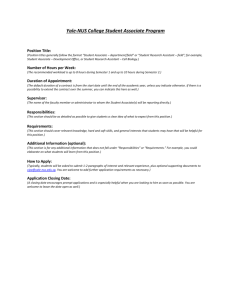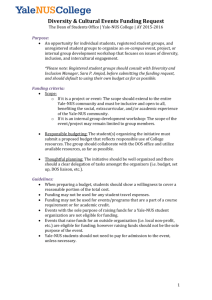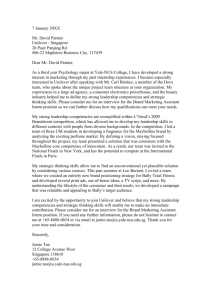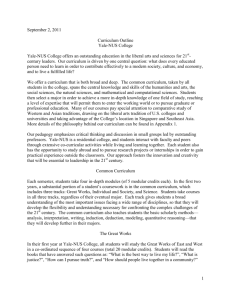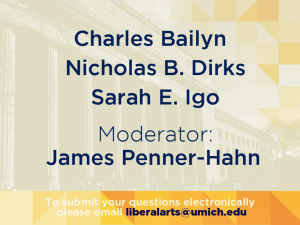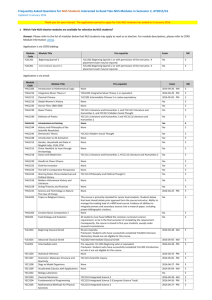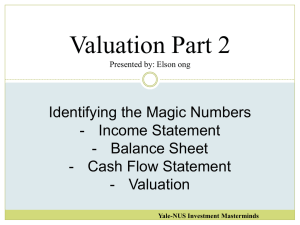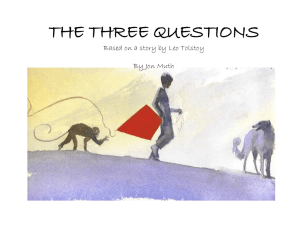Center for Teaching and Learning - The TLA Committee - Yale
advertisement
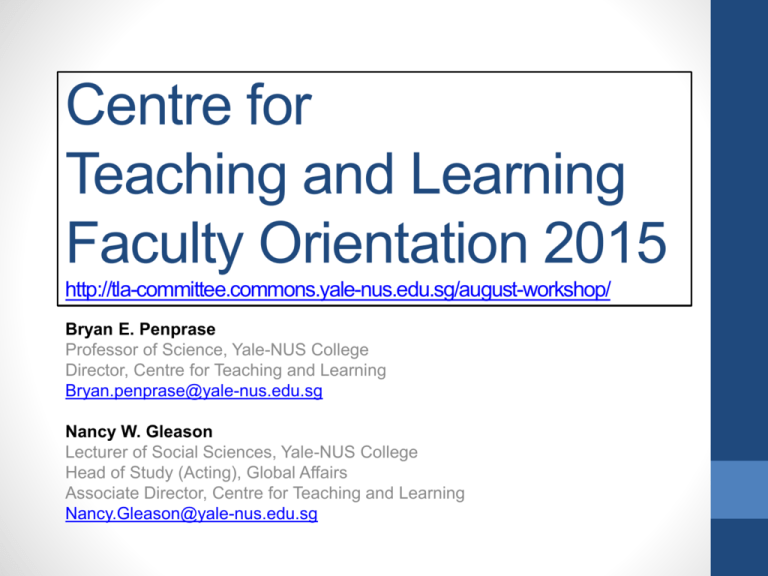
Centre for Teaching and Learning Faculty Orientation 2015 http://tla-committee.commons.yale-nus.edu.sg/august-workshop/ Bryan E. Penprase Professor of Science, Yale-NUS College Director, Centre for Teaching and Learning Bryan.penprase@yale-nus.edu.sg Nancy W. Gleason Lecturer of Social Sciences, Yale-NUS College Head of Study (Acting), Global Affairs Associate Director, Centre for Teaching and Learning Nancy.Gleason@yale-nus.edu.sg Agenda for Humanities Part 1 - The Yale NUS Centre for Teaching and Learning Bryan Penprase 10 minutes • Overview of the new Centre • Some of the Questions we hope to address at the Center • Upcoming Events, Programs and Attractions Part 2 - Course Design and Assessment Nancy Gleason, 30 minutes • Completing New Course Forms • Running impactful discussion sections • Getting Started in the classroom – 5 basic teaching tips Part 3 - Active Learning and Classroom Management Bryan Penprase, 30 minutes)Applying learning taxonomies Centre for Teaching & Learning The Yale-NUS College Centre for Teaching and Learning (CTL) seeks to foster excellence in teaching, technology application and course design within the Yale-NUS College community and promote discussions and collaborations amongst the faculty in these areas. CTL Service & Programming • Consultations: course design; effective office hours; crafting assessments; managing students; advising techniques; teaching culturally diverse students; technology and teaching options; and more • Open Hours on Thursday 10am to 12noon: Peer Rooms on main level of the Library learning space • Monthly Social Teaching Events to be advertised • Wine cheese receptions, lunches and teas • August 13th Teaching Talk • John Kelly, Professor of Anthropology, University of Chicago “Emotions of First Year Teaching” • Faculty Teaching Workshops – November 30th, December 1st, 2nd 12pm – 5pm @ Yale-NUS • New CTL website will be launched Consultation Office Hours • Thursdays 10am – 12noon: open door teaching and course design assistance available • Email Bryan or Nancy if you would like an appointment outside of this time frame – we’ll be glad to meet you • Bryan.penprase@yale-nus.edu.sg • Nancy.Gleason@yale-nus.edu.sg • Teaching@yale-nus.edu.sg Topics the Centre will address • Best practice in design and assessment of interdisciplinary courses • Incorporating active learning into larger lectures • Integrating experiential and international work into undergraduate classes • Training teams of faculty to work well together • Integrating technology into our classrooms, yielding global classrooms • Best practice in effective assessment of student learning outcomes and attitudes Additional resource CDTL • Center for Development of Teaching and Learning @ NUS • http://www.cdtl.nus.edu.sg Course Design and Assessment Nancy W. Gleason Course Design • What strategies have you deployed for course design in the past? • What has worked best and what elements need improvement? • What things would you like to learn how to do going forward? Course Design & Assessment Course Design & Assessment Learning Outcomes • Analyzing: discern patters; organize parts; recognize hidden meanings; identify components, simplify complex information; metacognition. • United learning outcome verbs: analyze, calculate, categorize, compare, contrast, correlate, deconstruct, detect, differentiate, discriminate, distinguish, examine, explain, interpret, organize, quantify, research, scrutinize, separate, sequence, subdivide, survey, test, translate. • Some possible assessment tools: Class debate, roleplay simulation, oral presentation, written assignment, etc. Humanities Learning Outcomes • Humanities provide the terms of art and philosophy that are irreplaceable for us to articulate description of the world • Education in the humanities provides capacity to describe experience of the world and provoke evaluation of the world • It also seek to harness art’s capacity to help us imagine transformation of the world • How do we assess that? AACU Value Rubrics Integration of Learning Outcomes Canvas & Assessment Canvas and Assessment Questions Facilitating Discussion in the Classroom Designing discussion sessions around the learning outcomes and assessment criteria you have created Seminars What are some of the victories or challenges you have faced in your discussion sections? Discussion techniques assist with following objectives • Students learn to think in terms of the subject matter • Students learn to evaluate the logic of and evidence for their own and others’ positions • Give students opportunities to formulate applications of principles • Develop motivation for further learning • Helps students articulate what they have learned • Get prompt feedback on student understanding or misunderstanding Discussion Sessions • How do you typically prepare for and start a discussion session? • What are the differences between the disciplines within the humanities? Starting Discussions • Common experience • Controversy • Starting discussions with questions (give them TIME to answer!) • Interpretation questions: “How does the idea of ___ apply to ___?” • Connective and causal effect questions • Comparative questions • Evaluative questions – “Which of two theories better accounts for the data?” • Critical questions Barriers to Discussion • Student habits of passivity • Failure to see the value of discussion • Fear of criticism or of looking stupid • Push toward agreement or solution before alternative points of view have been considered • Feeling that the task is to find the answer the instructor wants rather than to explore and evaluate possibilities Solutions to participation challenges • Create an expectation of participation up front and continually remind students of value of participation • Ask students to take a moment to write out their own answers to a question – can ask a reserved student “what did you write” • Share questions for seminar in advance so that students have time to prepare answers/think • Use Canvas discussion forum to encourage shy students Solutions to participation challenges Examples of Exercises: • Buzz groups exercise/ Think, Pair, Share: See See chapter 5 of Teaching Tips handout • The inner circle or fishbowl exercise: half class discusses while other half observes, then switch • Circle of Voices Activity: See Brookfield and Preskill’s Discussion as a way of Teaching (1999) Movement Exercise • Pose multiple choice or true/false questions to students • Ask students to physically move to different parts of the room to reflect their responses. • Then, while there, ask students to pair up (or get into small groups) to discuss responses • Small groups then report-back to the larger class Student Lead Role Student as Seminar Moderator Effective Discussion Sessions • Communicate to students the importance of discussion to their success in the course as a whole, repeatedly • Clarify expectations of the discussion at the outset – be respectful of perspectives etc • Keep the discussion focused: brief interim summaries of what has been discussed are helpful Effective Discussion Sessions • Bring closure to the discussion when done: “Are there any final comments before we pull these ideas together?” • Summary cab demonstrate how the discussion progressed • End by acknowledging insightful comments from students • Assign students responsibility for summarizing the major points on course discussion board – can use Canvas Collaborations function for this 5 Basic Tips for First Time Teachers 1. Tell the students WHY they are doing what they are doing 2. Stagger your grading so that students know where they stand early on and so that you are not grading everything at the end of the semester 3. Organize a break from routine for you and the students during the semester, ie. movie, guest speaker, field trip, visit from Library etc 4. Collaborate with YNC resource centres: Centre for Teaching and Learning, the library, ERT team and the writing centre 5. Vice Rectors can help with challenging students and should be notified if a student is struggling/disruptive Questions? Thank you Centre for Teaching and Learning Yale-NUS College August 2015 Teaching@yale-nus.edu.sg
